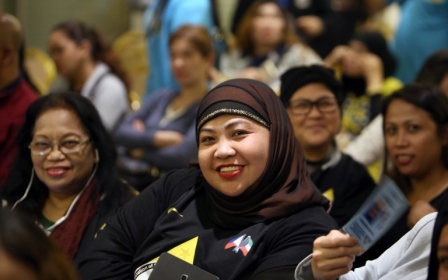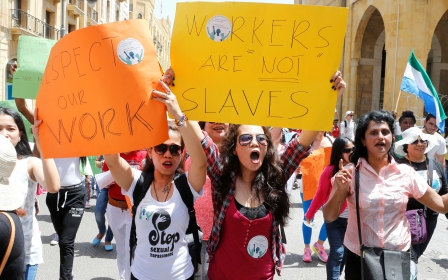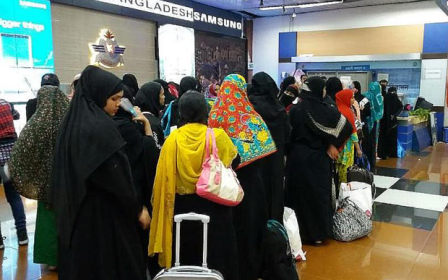Philippines considering a ban on domestic workers travelling to Kuwait

After the apparent murder of a Filipino migrant worker in Kuwait, the Philippines is looking into re-introducing a ban on domestic workers travelling to work in the Gulf country, a presidential spokesperson has said.
Salvador Panelo, President Rodrigo Duterte's spokesman, said that the president was not ruling out a review of the country's current worker agreement with Kuwait.
The spokesman on Monday also cited Secretary of Labour Silvestre Bello III as saying that Kuwait has breached the existing memorandum of understanding between the two nations.
The statement comes after calls by rights groups for the government to take action over the death of Constance Lago Dayag in Kuwait City last week.
Dayag had died of injuries that caused haematoma, according to Filipino officials.
New MEE newsletter: Jerusalem Dispatch
Sign up to get the latest insights and analysis on Israel-Palestine, alongside Turkey Unpacked and other MEE newsletters
Kuwait has arrested a suspect in Dayag's death.
The 47-year-old domestic worker's death has renewed tensions between the Philippines and Kuwait.
Last year, the discovery of the remains of another Filipino domestic worker in Kuwait caused a diplomatic crisis between the two countries, with Duterte suspending the deployment of Filipino workers to the Gulf country.
The impasse ended with an agreement that grants better working conditions to Filipino labourers in the Arab nation.
The Filipino Department of Foreign Affairs said it was working to bring Dayag's remains back to the Philippines and that it has already filed a criminal case on behalf of the deceased woman's next of kin.
Last week, Bello III pledged justice for Dayag. The secretary also suggested that the domestic worker's body showed signs that raised concerns that she was sexually abused before her death.
"I am taking the Kuwaiti government to task for the gruesome death of yet another Filipino worker in the hands of her employer in Kuwait," Bello told reporters in Manila on Thursday.
"Aside from apparent violation of the agreement on the protection of Filipinos between our government and Kuwait, there appears to have been a breach of the employment contract by the foreign employer...We shall do everything to find justice for her death."
Local rights group Migrant Internationale condemned Dayag's death and urged the two governments to ensure accountability for the apparent murder.
"The Kuwaiti government and the Philippines must be held responsible for maintaining the safety of workers like Constance who are vulnerable to abuse and persecution," the group said in a statement.
"The workers were enslaved by their employers and neglected by Kuwait and the Philippines government. The policy goes on to kill workers who go overseas in the hope of meeting their family's needs in the Philippines."
Middle East Eye delivers independent and unrivalled coverage and analysis of the Middle East, North Africa and beyond. To learn more about republishing this content and the associated fees, please fill out this form. More about MEE can be found here.




